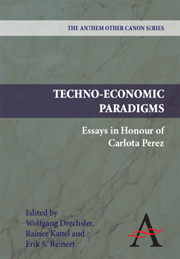Book contents
- Frontmatter
- Contents
- Preface
- Techno-Economic Paradigms
- 1 Introduction: Carlota Perez and Evolutionary Economics
- 2 Developing Innovation Capability: Meeting the Policy Challenge
- 3 Slow Food, Slow Growth … Slow ICT: The Vision of Ambient Intelligence
- 4 Technical Change and Structural Inequalities: Converging Approaches to Problems of Underdevelopment
- 5 The New Techno-Economic Paradigm and its Impact on Industrial Structure
- 6 Governance in and of Techno-Economic Paradigm Shifts: Considerations for and from the Nanotechnology Surge
- 7 Innovation Policy and Incentives Structure: Learning from the Mexican Case
- 8 Schumpeter's Business Cycles and Techno-Economic Paradigms
- 9 Asian Innovation Experiences and Latin American Visions: Exploiting Shifts in Techno-Economic Paradigms
- 10 Doing Capitalism: Notes on the Practice of Venture Capitalism (Revised and Extended)
- 11 Small States, Innovation and Techno-Economic Paradigms
- 12 Financial Experimentation, Technological Paradigm Revolutions and Financial Crises
- 13 Why the New Economy is a Learning Economy
- 14 The Art of Macro-Qualitative Modelling: An Exploration of Perez' Sequence Model of Great Surges
- 15 Technology, Institutions and Economic Development
- 16 Techno-Economic Paradigms and the Migration (Relocation) of Industries to the Peripheries
- 17 On the Discreet Charm of the (Rentier) Bourgeoisie: The Contradictory Nature of the Installation Period of a New Techno-Economic Paradigm
- 18 Production-Based Economic Theory and the Stages of Economic Development: From Tacitus to Carlota Perez
- 19 Carlota Perez' Contribution to the Research Programme in Public Management: Understanding and Managing the Process of Creative Destruction in Public Institutions and Organizations
- 20 Carlota Perez – Her Biography and the Origins of her Ideas
- Notes
- Bibliography Carlota Perez
3 - Slow Food, Slow Growth … Slow ICT: The Vision of Ambient Intelligence
Published online by Cambridge University Press: 05 March 2012
- Frontmatter
- Contents
- Preface
- Techno-Economic Paradigms
- 1 Introduction: Carlota Perez and Evolutionary Economics
- 2 Developing Innovation Capability: Meeting the Policy Challenge
- 3 Slow Food, Slow Growth … Slow ICT: The Vision of Ambient Intelligence
- 4 Technical Change and Structural Inequalities: Converging Approaches to Problems of Underdevelopment
- 5 The New Techno-Economic Paradigm and its Impact on Industrial Structure
- 6 Governance in and of Techno-Economic Paradigm Shifts: Considerations for and from the Nanotechnology Surge
- 7 Innovation Policy and Incentives Structure: Learning from the Mexican Case
- 8 Schumpeter's Business Cycles and Techno-Economic Paradigms
- 9 Asian Innovation Experiences and Latin American Visions: Exploiting Shifts in Techno-Economic Paradigms
- 10 Doing Capitalism: Notes on the Practice of Venture Capitalism (Revised and Extended)
- 11 Small States, Innovation and Techno-Economic Paradigms
- 12 Financial Experimentation, Technological Paradigm Revolutions and Financial Crises
- 13 Why the New Economy is a Learning Economy
- 14 The Art of Macro-Qualitative Modelling: An Exploration of Perez' Sequence Model of Great Surges
- 15 Technology, Institutions and Economic Development
- 16 Techno-Economic Paradigms and the Migration (Relocation) of Industries to the Peripheries
- 17 On the Discreet Charm of the (Rentier) Bourgeoisie: The Contradictory Nature of the Installation Period of a New Techno-Economic Paradigm
- 18 Production-Based Economic Theory and the Stages of Economic Development: From Tacitus to Carlota Perez
- 19 Carlota Perez' Contribution to the Research Programme in Public Management: Understanding and Managing the Process of Creative Destruction in Public Institutions and Organizations
- 20 Carlota Perez – Her Biography and the Origins of her Ideas
- Notes
- Bibliography Carlota Perez
Summary
More or less a decade ago, I started cooperating on a project that was to turn into one of the biggest thrills of my professional life. At the Institute for Prospective Technological Studies (IPTS), we were tasked by the ISTAG to chart the future of Europe's information society. European policy makers needed an independent vision that went beyond the infrastructure one being propagated mainly by the United States. The result was a comprehensive concept called Ambient Intelligence (ISTAG 2001). We produced a European project for 2010 and beyond based on several visions of the future and what they implied for research and development in information and communication technologies. Our focal point was that within a not-too-distant future, our real environment would be filled to the hilt with intelligent hardware and software. It would allow us to envisage what we would be able to do as employee, citizen, student, human being – you name it. That is why Ambient Intelligence is more than ‘ubiquitous computing’, one of the futuristic visions that was then especially popular in the United States.
Let me back up this vision with some excerpts:
Ambient Intelligence (AmI) stems from the convergence of three key technologies: Ubiquitous Computing, Ubiquitous Communication, and Intelligent User-Friendly Interfaces. In the AmI vision, humans will be surrounded by intelligent interfaces supported by computing and networking technology which is everywhere, embedded in everyday objects such as furniture, clothes, vehicles, roads and smart materials, even particles of decorative substances like paint. […]
- Type
- Chapter
- Information
- Techno-Economic ParadigmsEssays in Honour of Carlota Perez, pp. 39 - 50Publisher: Anthem PressPrint publication year: 2009



